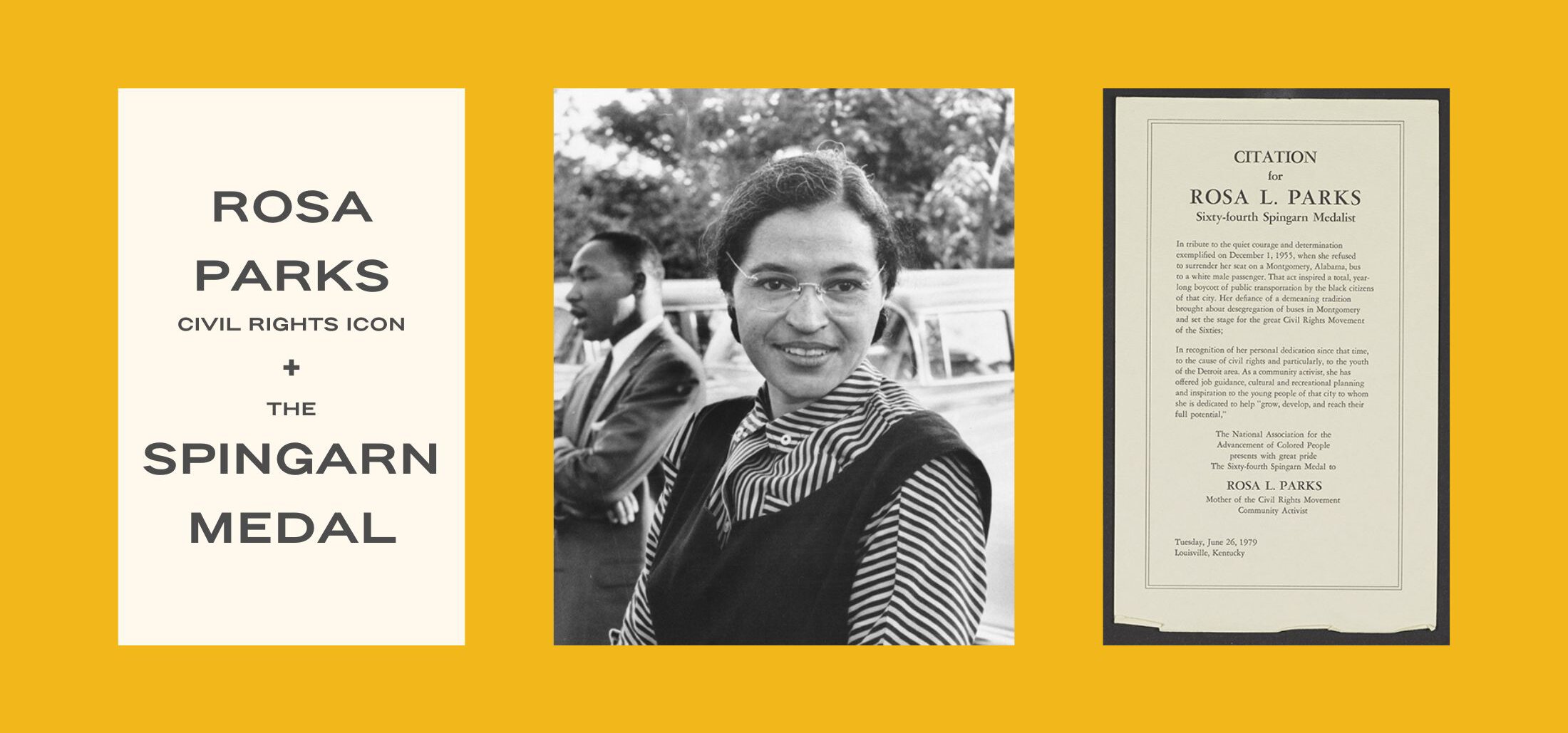ROSA PARKS, ICON OF CIVIL RIGHTS ACTIVISM + SPINGARN MEDAL RECIPIENT Lead Image

ROSA PARKS, ICON OF CIVIL RIGHTS ACTIVISM + SPINGARN MEDAL RECIPIENT
"In tribute to the quiet courage and determination exemplified on December 1, 1955, when she refused to surrender her seat on a Montgomery, Alabama, bus to a white male passenger. That act inspired a total, year-long boycott of public transportation by the black citizens of that city. Her defiance of a demeaning tradition brought about desegregation of buses in Montgomery and set the state for the great Civil Rights Movement of the Sixties;
In recognition of her personal dedication since that time, to the cause of civil rights and particularly, to the youth of the Detroit area. As a community activist, she has offered job guidance, cultural and recreational planning and inspiration to the young people of that city to whom she is dedicated to help “grow, develop, and reach their full potential,”
This is the engraving upon Rosa Parks’ Spingarn Medal, the NAACP’s highest honor, which Parks received in 1979 in recognition for her contribution to desegregation as catalyst for the Montgomery bus boycott, which helped pave the way the Civil Rights Movement of the 1960s. It’s one of legions of honors bestowed upon the Alabama native and Detroit devotee. With Rosa Parks Day and Black History Month upon us, we'd like to revisit the contribution by the Spingarns, former owners of Troutbeck.
Parks is one of the most historically recognizable Spingarn Medal recipients; her story of “quiet courage” is taught in schools and commemorated with dedications and honors across the globe, far beyond America, where she’s also recipient of the Presidential Medal of Freedom and the Congressional Gold Medal. But because of Parks’ international celebrity, she’s an excellent “way in” to the historic significance of the Spingarn Medal, and most importantly, the individuals it recognizes.
Established in 1914 by Joel Elias Spingarn — former owner of Troutbeck, chairman of the Board of Directors of the NAACP and one of its first Jewish leaders — the Spingarn Medal was to be awarded annually in perpetuity to “the man or woman of African descent and American citizenship who shall have made the highest achievement during the preceding year or years in any honorable field.”
The Spingarn Medal was established just five years after the NAACP was founded — by W.E.B. Du Bois, Mary Ovington, Moorfield Storey and Ida B. Wells — and two years before Joel Spingarn, his wife Amy and brother Arthur, hosted a seminal early NAACP meeting here at Troutbeck, their home. This commemorative gesture on Spingarn’s part was not the culmination of a life in civil rights, but rather a mid-life act, consistent with ongoing pursuit of racial justice: as a former delegate for the Progressive Party at the national conventions of 1912 and 1916, he twice failed at adding a statement against racial discrimination to the party's platform, but he sought new and creative ways to fight discrimination.
This February 4th, on Rosa Parks birthday, we take the chance to revisit the Spingarn Medal and its extraordinary recipients. While many, like Parks, are familiar names woven into the collective consciousness—such as Martin Luther King Jr., Harry Belafonte, Sidney Poitier, Duke Ellington, General Colin Powell and Maya Angelou—it’s illuminating, dually important and inspiring to familiarize oneself with all the Spingarn Medal recipients, particularly those who may not have made headlines or have national holidays dedicated to them, but which the medal recognizes for their extraordinary contributions to Black community and its progress. Tracing the recipients is a lesson in Black history, an inspiring path for all those who visit, work with or simply appreciate Troutbeck.
As the Troutbeck Symposium, in its third year, draws near on May 2, 2024, we'd like to shine a light on late-1920s and 1930s recipients, educators Mordecai Wyatt Johnson, Henry Hunt, Robert Russa Moton, William Taylor Burwell Williams, Mary McLeod Bethune and John Hope. The Troutbeck Symposium and our community partners support local educators, enabling students to pull narrative threads to reveal under-told histories of marginalized people.









